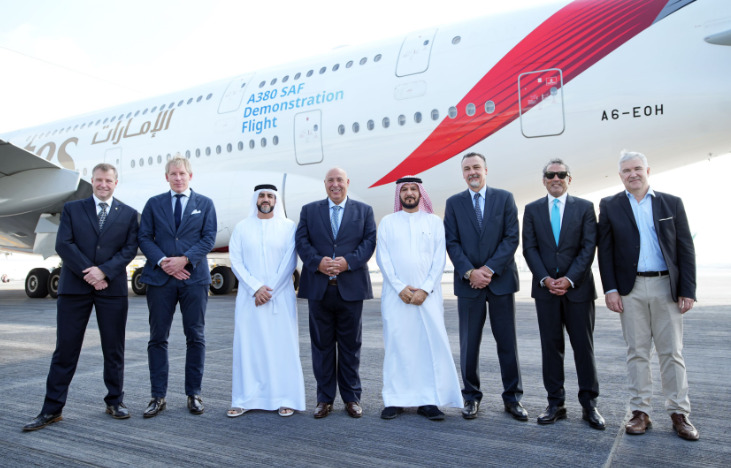Emirates, an airline based at Dubai International Airport, ran an Airbus A380 on 100% Sustainable Aviation Fuel (SAF) fuel. In collaboration with Airbus, Engine Alliance, Pratt & Whitney, ENOC, Neste, and Virent, the carrier claims to have been the first to accomplish this. All four engines were powered by SAF, with one exception.
100% SAF flight for 30 minutes
Emirates Uses Only SAF To Fly An Airbus A380. Emirates said that the 100% SAF flight demonstrated the promise of alternative fuels “as a drop-in replacement that matches the technical and chemical requirements of jet fuel, while being a more sustainable alternative.” The airline further stated that SAF lowers carbon emissions by up to 85%, with the reductions determined by recognized lifecycle assessment (LCA) approaches, like the Carbon Offsetting and Reduction Scheme for International Aviation (CORSIA) of the International Civil Aviation Organization (ICAO).
Read more: Inflows And Oil Prices Will Strengthen The Rupee Offsetting The Dollar’s Improvement.
The flight, which took place on November 22, 2023, using an Airbus A380 registered as A6-EOH, was described by the airline as having “paved the way for future standardization, qualification and adoption for 100% SAF flying, as governments adopt broader strategies to support the production and scale up of SAF.” Additionally, it demonstrates that SAF is a secure and reliable fuel to use on commercial aircraft.
A6-EOH took off and landed at DXB after spending 37 minutes in the air, according to data from Flightradar24. The aircraft arrived from Munich Airport on November 16 and was held in Dubai for six days before to its departure on the demonstration flight. Airbus, Pratt & Whitney, Neste, Virent, ENOC, and Engine Alliance—a joint venture between Pratt & Whitney and GE Aerospace—”have been working on the testing, technical assessments and data analysis for today’s flight,” according to a statement from Emirates.
“Another proud moment for Emirates and our partners, as we put words into action with the research into and the trialling of higher concentrations of SAF to eventually lead to industry adoption of 100%,” stated Adel Al Redha, Chief Operating Officer of Emirates.
Another 100% SAF aircraft
Previously, in January 2023, Emirates flew another 100% SAF demonstration flight on one of their Boeing 777-300ER aircraft, registered as A6-EBM. The 777-300ER then took off and returned to DXB following a test flight that lasted more than 40 minutes. Following both flights, Emirates reaffirmed that only a blend of 50% kerosene and 50% SAF is permissible for use as fuel in commercial aircraft; 100% SAF fuel is not.
The airline also mentioned that it recently started utilizing SAF for commercial flights out of DXB, with Shell Aviation supplying Emirates with the more environmentally friendly fuel. The airline reports that it has received 315,000 gallons (1.1 million liters) of the alternative fuel from Shell Aviation for use on flights operating out of its central hub.
It has also extended its cooperation with Neste, a fuel manufacturer in Finland, so that in 2024 and 2025, the former would get over 3 million gal (11.3 million liters) of mixed SAF for flights from Singapore and Amsterdam. According to Emirates’ most recent financial report, the airline utilized 179 tonnes (197.3 tons) of SAF and 8.4 million tonnes (9.2 million tons) of jet fuel during the fiscal year 2022–2023.

